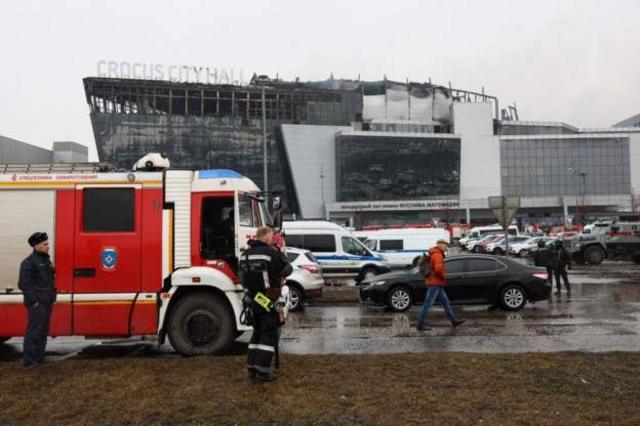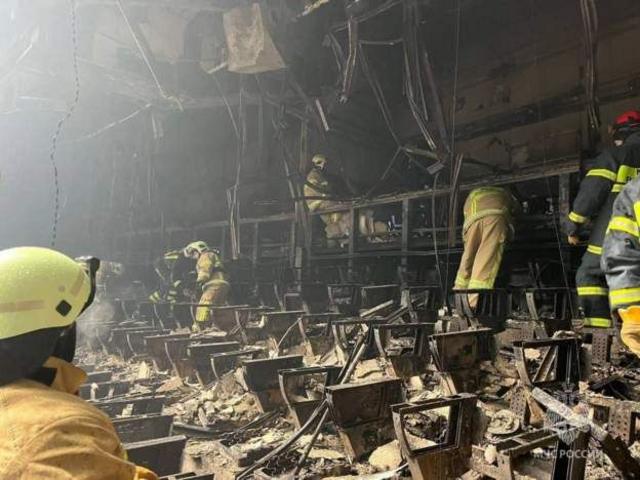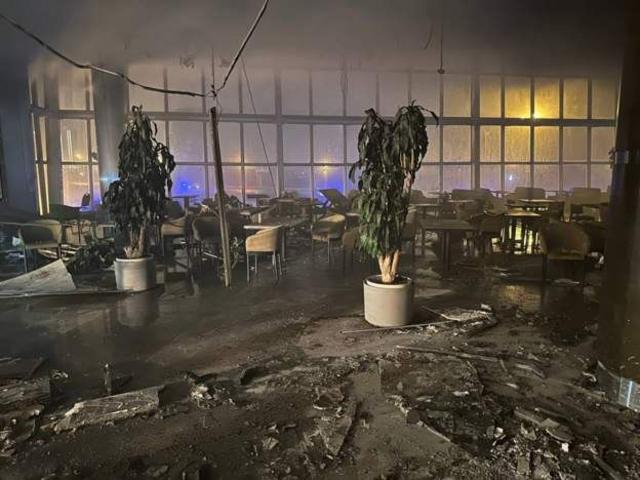Russian President Vladimir Putin said that the suspects in the attack on the concert allegedly had a prepared window for crossing the border with Ukraine. Putin said this in his address to Russians regarding the terrorist attack in "Crocus City Hall".
The Ukrainian authorities reject all these accusations. Mykhailo Podolyak, adviser to President Volodymyr Zelenskyi's office, said that Ukraine had nothing to do with these events. "Ukraine has never used terrorist methods of warfare, unlike Russia," said a Ukrainian official.
On the afternoon of March 23, already after Putin's statement, the ISIS group once again claimed responsibility for the attack on Crocus City Hall. "ID" made its first statement on March 22.
The number of people killed during the attack and as a result of the fire increased to 133. More than 140 were injured.
The Investigative Committee of the Russian Federation stated that the attackers used automatic weapons and flammable liquid to set fire to the concert hall.

PHOTO BY STRINGER / AFP
How to search for a Ukrainian trace
Immediately after the attack, the attackers were able to escape from the concert hall.
On the morning of March 23, Russian law enforcement officers announced the arrest of 15 people.
Four were detained in Bryansk region. It borders with Ukraine.
Almost immediately after reports of the arrest appeared, the Russian security forces announced that the suspects intended to cross the border between the Russian Federation and Ukraine.
The FSB said that the attackers allegedly had "relevant contacts" in Ukraine.
In his address regarding the terrorist attack, Vladimir Putin also referred to Ukraine.
"All four performers were found and detained. They tried to escape and moved towards Ukraine, where a window for crossing the border had previously been prepared for them. We faced not just a cynically planned terrorist attack, but a prepared mass murder of defenseless people. The criminals went to kill," said the Russian president in his address. He compared the attackers to Nazis.
Putin made the statement nearly 20 hours after the attack. Initially, it was announced that his address would be at night. But then it was canceled.
Even before any official information appeared, some Russian politicians began to blame Ukraine for the attack.
The Deputy Chairman of the Security Council of the Russian Federation, Dmytro Medvedev, also stated that if the involvement of Kyiv and its "masterminds" is established, then all of them should be "found and mercilessly destroyed as terrorists."

PHOTO AUTHOR, CHS RF
Two ISIS statements
Late in the evening of March 22, the terrorist group "Islamic State" claimed responsibility for the attack.
In addition, the mass media reported that citizens of Tajikistan are among the detainees. For example, Russian Telegram channels circulated a photo allegedly obtained by Russian law enforcement immediately after the terrorist attack as a reference for arrest.
They were allegedly carrying four citizens of Tajikistan. The authorities of this country deny the involvement of its citizens in the attack.
The editor-in-chief of the Russian state channel RT, Margarita Simonyan, published a video of the interrogation of the detainees and said that it was not ISIS, but Ukrainians, who were behind the attack.
In the video, a man of about 25-30 years old, who is shaking all over, speaks Russian with a noticeable accent. He says he arrived from Turkey on March 4. His throat is pressed against the boot. The hands are folded behind the back.
He says that he was offered half a million rubles for killing people. According to him, the organizers of the attack gave the task to kill all the people in the hall.
Meanwhile, Russian television, covering the terrorist attack, does not focus on ISIS. The main suspects in the attack, according to Russian TV, are Ukraine and the United States.
The version with the "Islamic State" is presented as a throw-in, and outright fakes and conspiracy theories are used.
On the afternoon of March 23, the ISIS group made a new statement, in which it once again refers to its responsibility for the attack on Crocus City Hall.
According to the BBC's expert on extremist groups, Mina Al-Lami, this message does not mention which regional branch prepared and carried out the attack.
In a message from the Amaq agency, which is linked to IS, there is a photo in which four of the attackers may appear. In the photo, their faces are half covered by masks and blurred.
In terms of motive, Amaq says "the attack took place in the context of an ongoing normal war between the Islamic State and [anti-Islamic] countries."
IS's mouthpiece claims that the attack was carried out by "militants" who were armed with "machine guns, pistols, knives and incendiary bombs" and that the attack was preceded by a "coordinated" reconnaissance mission.
Russia has not yet commented on these statements, but the United States has said that it is likely that the Islamic State group may be behind the attack.
Earlier it was reported that the IS-related "Vilayat Kavkaz" or "Vilayat Khorasan" - an Afghan cell of the IS - could be involved in the attack.

PHOTO AUTHOR, MOSCOW REGION GOVERNMENT
How Ukraine responded
The terrorist attack in the suburbs of Moscow is a provocation by Putin's regime, about which Russia was warned, said Andriy Yusov, a representative of the Main Intelligence Directorate of the Ministry of Defense of Ukraine.
"The Kremlin tyrant started his career with this and wants to end it with the same crimes against his own citizens," he said.
A representative of the Main Directorate of Intelligence of the Ministry of Defense also commented on the statement of the FSB about the intentions of the attackers to go to Ukraine. He called her nonsense.
"These statements of the FSB are aimed either at the frankly ignorant or at the zombified Russian population. To imagine that after more than two years of full-scale invasion, terrorists are heading to the border regions, which are currently the most saturated with security forces, special services and actually the military, I think that comments here are superfluous," he said.
The representative of the GUR emphasized that the accusations of the FSB are "lies and attempts to attract Ukrainian attention on the part of the Russian regime, which they have been doing since the first minutes of this terrorist attack."
Yusov added that the GUR refrains from commenting on the involvement of ISIS or other terrorist groups in the terrorist attack in the suburbs of Moscow.
Mykhailo Podolyak, adviser to the head of the President's Office, said that Kyiv was not involved in the terrorist attack near Moscow, because it has a full-scale war on the battlefield, and that is where everything should be resolved.
"Ukraine has never used terrorist methods of war, terrorism as a method of waging war, unlike Russia," he said.
Washington said that there were no signs of Ukraine's involvement in the attack.
"There are currently no indications that Ukraine or Ukrainians were involved in the shooting," White House National Security Council Strategic Communications Coordinator John Kirby told reporters. "At this early stage, I would not advise you to look for any connection with Ukraine." .
"It was already"
Mykhailo Podolyak emphasized that in recent Russian history there have been many cases when terrorist attacks were used against their own citizens.
"Kashir highway, Nord-Ost - to justify one or another genocidal actions against one or another ethnic group," he said.
About 20 years ago, a series of terrorist attacks took place in Russia - the blowing up of residential buildings in Moscow, the taking of hostages at the "Nord-Ost" performance. The official authorities of Russia accused Chechen militants of organizing these terrorist attacks. From 1999 to 2009, Russia participated in the Chechen war.
In 2002, former FSB employee Oleksandr Lytvynenko wrote the book "The FSB undermines Russia: The Federal Security Service is an organizer of terrorist acts, kidnappings and murders."
In it, he published an alternative version of the terrorist attacks. In his opinion, the explosions of residential buildings were organized by the FSB of Russia in order to justify the Second Chechen War and consolidate Vladimir Putin in power.
In 2006, Lytvynenko was poisoned with radioactive polonium.
At the beginning of March, the US embassy in Russia warned about possible preparations for terrorist attacks in Moscow. In particular, US citizens were urged to avoid large gatherings of people, such as concerts.
Then Putin called such warnings blackmail and provocation.

